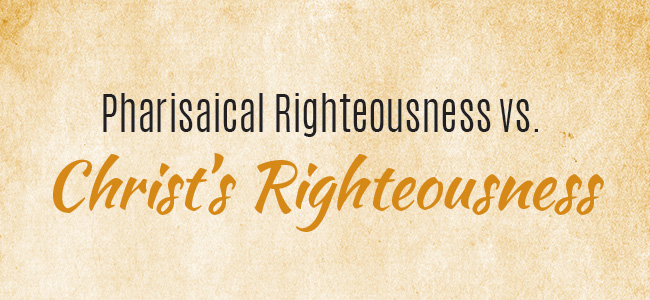Preparing for the Latter Rain

In His sermon on the mount, Christ declared to His audience: “I say unto you, That except your righteousness shall exceed the righteousness of the scribes and Pharisees, ye shall in no case enter into the kingdom of heaven” (Matthew 5:20).
The Lord here made a clear distinction between Pharisaical righteousness and His own righteousness—and He identified the possession of the true righteousness as an essential condition for entrance into the kingdom of heaven.
The scribes and Pharisees were well respected and reverenced by the people because of their show of pretentious righteousness. The people were deceived by the public behavior of their leaders. They professed high spirituality—yet their actual life contradicted their profession. What were the basic differences between the righteousness of the Pharisees and the righteousness of Christ? The former was made up of exterior things: outward show, appearance, and pretense—but the latter came genuinely from the heart.
“The rabbis counted their righteousness a passport to heaven; but Jesus declared it to be insufficient and unworthy. External ceremonies and a theoretical knowledge of truth constituted Pharisaical righteousness. The rabbis claimed to be holy through their own efforts in keeping the law; but their works had divorced righteousness from religion. While they were punctilious in ritual observances, their lives were immoral and debased. Their so-called righteousness could never enter the kingdom of heaven.”1
Summarizing, we see the righteousness of the Pharisees:
External ceremonies;
Theoretical knowledge;
Based on their own efforts;
Punctilious in ritual observances.
On the other hand, regarding the righteousness of Christ, we quote from The Desire of Ages:
“The righteousness which Christ taught is conformity of heart and life to the revealed will of God. Sinful men can become righteous only as t hey have faith in God and maintain a vital connection with Him. Then true godliness will elevate the thoughts and ennoble the life. Then the external forms of religion accord with the Christian’s internal purity. Then the ceremonies required in the service of God are not meaningless rites, like those of the hypocritical Pharisees.”2
The righteousness of the Pharisees comes from the outside and never reaches the heart. It is the result of human effort. It is human righteousness. And the Bible says that our righteousness is just filthy rags. It cannot satisfy God’s requirements. In contrast, the righteousness of Christ comes from above, is received by faith—and, taking root in the heart, it then reflects outwardly to the external life. It is obtained by faith through vital connection with Jesus.
“Now the righteousness of God without the law is manifested, being witnessed by the law and the prophets; even the righteousness of God which is by faith of Jesus Christ unto all and upon all them that believe: for there is no difference: for all have sinned, and come short of the glory of God; being justified freely by his grace through the redemption that is in Christ Jesus. . . . Therefore we conclude that a man is justified by faith without the deeds of the law. . . . Do we then make void the law through faith? God forbid: yea, we establish the law” (Romans 3:21–24, 28, 31).
Christ’s righteousness is the only true passport to heaven. And we can obtain it through faith and vital connection with Him.